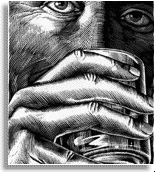Colour :
As with wine tasting, note the colour, depth and clarity. New spirit, fresh from the still is colourless. Whisky obtains its natural colour from the cask in which it matures. The colour will depend not only on how long it has lain in the wood, but also on whether the barrel is on its first, second or third filling.
Nose :
Experienced tasters swirl the whisky neat in a glass and nose it gingerly. Don't inhale too deeply as the strength of the alcohol may dull your perceptions. Note the key aromas which will be somewhat subdued, spirity and vaporous. Laphroaig, like all Islay malts, is markedly aromatic with a defined aroma spectrum.
For tasting purposes, the whisky should then be diluted to around 20% alcohol (mix with about 50% water). This agitates and 'awakens' the spirit. Swirl the glass and smell, first over the top of the glass (the bouquet) and then deep within it (the aroma). Note your immediate impressions; try to put words to the scents which first strike you.


|
There's no average
mark for our malt
Its unique, uncompromising
taste has always polarised
opinions
Take a sip but be ready to
take sides
|
 Body :
The body of a malt whisky is determined through 'mouthfeel'. Take a large enough sip to fill your mouth and roll it over your tongue. Then consider the 'texture' as it slides across your palate. Malts can generally be divided into three textures:
Body :
The body of a malt whisky is determined through 'mouthfeel'. Take a large enough sip to fill your mouth and roll it over your tongue. Then consider the 'texture' as it slides across your palate. Malts can generally be divided into three textures:
| 'mouth coating' | means it is viscous |
| 'mouth warming' | means it is spirity |
| 'mouth furring' | means it is astringent and dry |
Palate :
Note the initial flavours as the whisky slides over your taste buds. As you swallow, compare the back-palate flavour with that promised by the nosing and the first taste. Is it consistent and does it add an extra dimension to your appreciation?
Finish :
The finish is the aftertaste of the whisky. The length of the finish is critical. Is there a rapid fade or does the flavour linger, with echoes of earlier scents returning to extend your satisfaction?

